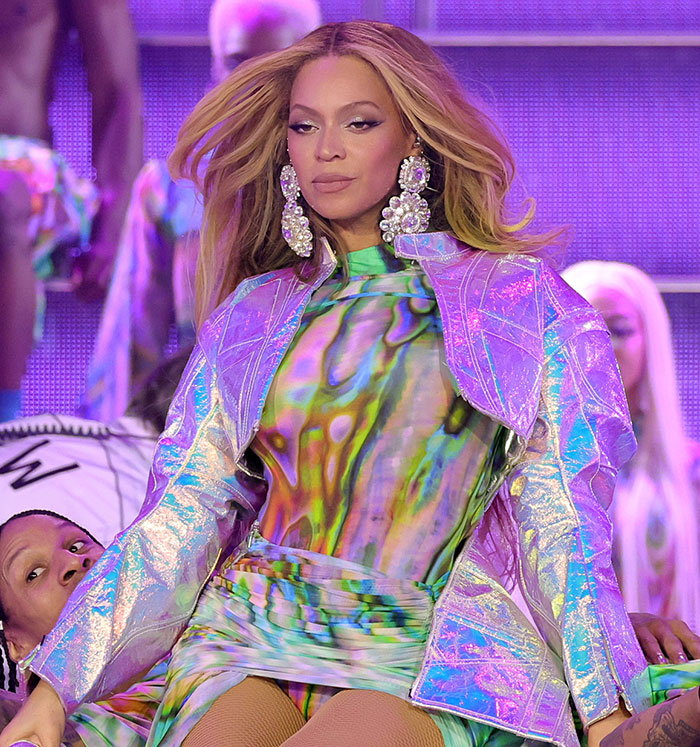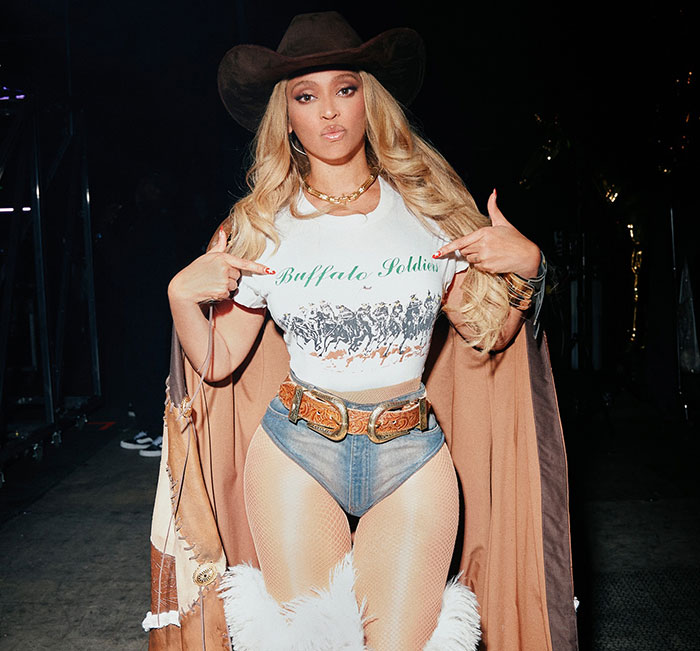During the Paris stop of her Cowboy Carter World Tour in June 2025, Beyoncé wore a T-shirt referencing the “Buffalo Soldiers,” sparking debate about the historical context of these regiments and their legacy in U.S. history. While many recognize the Buffalo Soldiers as pioneering Black military units overcoming racism and fighting for opportunity in the post–Civil War U.S. Army, their role in westward expansion and the Indian Wars complicates their legacy.

What Happened at the Paris Concert?
During her Paris performance, Beyoncé appeared in a white T-shirt emblazoned with “Buffalo Soldiers” on the front, along with a historical text on the back. Fans shared images online showing the shirt featuring mounted cavalry imagery and a tribute to the all-Black regiments. The text included a description that named Native American groups, bandits, and others as “enemies of peace,” echoing language historically used in U.S. Army accounts of westward expansion.
The reaction among fans was divided. Some praised the reference to Black military history, while others criticized the choice, arguing it overlooked the impact of these units’ participation in U.S. government campaigns against Native American tribes during the 19th century. Discussions on social media described the shirt as “tone deaf,” “insensitive,” or historically oversimplified.
Who Were the Buffalo Soldiers?
The term “Buffalo Soldiers” originally referred to members of the U.S. Army’s 9th and 10th Cavalry Regiments, formed in 1866. According to the U.S. National Park Service (NPS), these all-Black units were created in the aftermath of the Civil War as part of a segregated Army structure. The soldiers served in the American West and elsewhere, facing discrimination within the military while also playing key roles in frontier campaigns. The name “Buffalo Soldiers” is believed to have been given by Native American adversaries, possibly out of respect for the soldiers’ fighting spirit or for their curly hair reminiscent of a buffalo’s mane Source: U.S. National Park Service.
Their Role in the Indian Wars
Buffalo Soldiers participated in numerous conflicts known as the Indian Wars, a series of military campaigns between the U.S. government and various Native American nations. According to the Smithsonian National Museum of African American History and Culture, these regiments were tasked with protecting settlers, building infrastructure, delivering mail, and engaging in military operations against Native peoples resisting displacement Source: Smithsonian NMAAHC.
Historians emphasize that while Buffalo Soldiers were groundbreaking in terms of racial integration in the military and often treated harshly by their own government, they were also instrumental in enforcing U.S. policies that led to the forced relocation and suppression of Native communities. This historical tension explains why references to them can be viewed as complicated or problematic in modern discussions.
The Text on the T-Shirt
Images circulating online showed that the back of Beyoncé’s T-shirt featured a lengthy printed passage, describing Buffalo Soldiers as combating “warring Indians, bandits, cattle thieves, murderous gunmen, bootleggers, trespassers, and Mexican revolutionaries.” Such wording closely resembles language found in 19th-century U.S. military accounts and recruitment materials that sought to justify expansion by labeling Native resistance and cross-border conflicts as threats to “peace and order” Source: U.S. Army Center of Military History.
Critics online argued that including this text without commentary or updated context risked presenting a one-sided or triumphalist view of westward expansion, ignoring the devastating impact on Native American communities.

Why the Backlash?
The criticism was largely about the perceived lack of historical nuance. Some social media users pointed out that highlighting the Buffalo Soldiers’ service without acknowledging the consequences for Native peoples could be seen as endorsing or celebrating that violence. Others called for more education and discussion about the complex, sometimes contradictory roles that marginalized groups can play in broader histories of colonization.
It’s worth noting that the Buffalo Soldiers are often celebrated within African American history for their resilience and military accomplishments in the face of racism and limited opportunity. According to the National Museum of African American History and Culture, these soldiers provided a model of Black achievement and discipline during an era of pervasive discrimination.
However, their participation in the U.S. military’s campaigns against Native tribes remains a source of discomfort for many, reflecting broader debates about how to commemorate or critique contested histories.
Historical Complexity Recognized by Scholars
Academic work on the Buffalo Soldiers tends to stress this dual legacy. Historian Frank N. Schubert, in Buffalo Soldiers, Braves, and the Brass, notes that these troops were both victims of systemic racism and agents of U.S. imperial policy. They fought for the same government that denied them equal rights while enforcing its expansionist aims against Native nations.
This tension is why the topic can be sensitive. Museums such as the Smithsonian’s National Museum of African American History and Culture and the Buffalo Soldiers National Museum in Houston, Texas, both address the military units’ bravery and skill as well as their role in the broader context of U.S. westward expansion Source: Buffalo Soldiers National Museum.
Beyoncé’s Artistic Themes
Beyoncé’s Cowboy Carter era has prominently engaged with American Western aesthetics and Black cowboy imagery, seeking to reclaim a space in U.S. popular culture often portrayed as exclusively white. In her album visuals and performances, she has included references to Black rodeo culture, western wear, and African American contributions to country music.
Her team has not issued any statement about the specific T-shirt controversy at the time of writing. There is no evidence of any formal apology or official explanation for the choice. The performance in Paris nonetheless sparked significant online discussion, with some fans defending the reference as an attempt to highlight underappreciated Black history, and others calling for greater care when engaging with its more difficult aspects.

Audience Reactions Remain Split
While some concertgoers and online commenters described the shirt as offensive or “tone deaf,” others urged nuance, noting that the Buffalo Soldiers’ story exemplifies how marginalized groups navigated impossible choices in a discriminatory society. Some fans said they hoped Beyoncé and her team would consult historians more carefully to ensure such references were framed with the needed historical complexity.
Conclusion: A Call for Thoughtful Engagement
The debate around Beyoncé’s Buffalo Soldiers T-shirt during her Paris show highlights the challenges of referencing historical figures or movements with complex legacies. It also shows the importance of historically informed artistic choices, especially for artists with global platforms.
Recognizing both the heroism and the problematic aspects of the Buffalo Soldiers’ service can promote a more complete understanding of American history. As conversations about representation, memory, and accountability continue, this moment has become part of a broader dialogue about how popular culture grapples with its past.
Sources:
-
U.S. National Park Service – Buffalo Soldiers
-
Smithsonian National Museum of African American History and Culture
-
U.S. Army Center of Military History
-
Buffalo Soldiers National Museum

